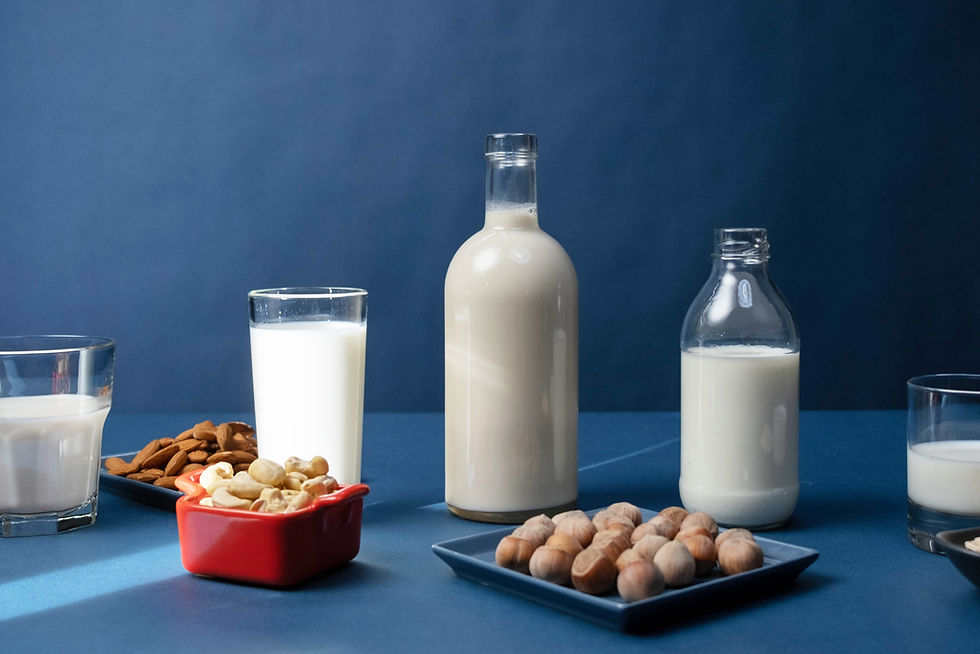The murky milk market
- Sandy Flynn
- Dec 19, 2023
- 4 min read
When you hit the milk section of the supermarket, it's overwhelming. There is an endless amount of choices. Is it better to have cow's milk or plant based milk? If you choose plant based milk, which one is healthiest? Let's seperate the facts from fiction and get some clarity.

Cow's milk is a really healthy option. It is a good source of essential nutrients such as calcium, vitamin D, vitamin B12, and high-quality complete protein. It contains all the essential amino acids the body needs. Unfortunately, commercially produces milk contains a lot of hormones and antibiotics. Choosing organic milks would remedy this concern. Another issue, cow's milk can trigger allergies or reactions in some people. ME! I discovered many years ago that I can't consume any dairy products as two things happen:
1. My skin breaks out. Not just pimples but a condition called acne cysts. (Yeah, it's about as sexy as it sounds).
2. Milk/diary creates a mucus response in my throat and airways. I have asthma so the added mucus makes asthma attacks more likely. Not breathing is about as awful as it gets so.... I made the decision to try plant-based milks.
So, if you're like me and conventional milk is out, which plant-based milk should you chose? First let’s look at the good side of milk alternatives.
Advantages of Plant-Based Milk:
Lower in Saturated Fat: Most plant-based milks are naturally lower in saturated fat compared to cow's milk.
Lactose-Free: Plant-based milks are suitable for those who are lactose intolerant.
Variety of Options: There are various plant-based milk options available, such as almond, soy, oat, rice, and coconut milk, providing choices for different taste preferences and dietary needs.
Vitamins and Minerals: Plant-based milks are often fortified with vitamins and minerals, such as vitamin D and calcium, making them comparable to cow's milk in nutritional value.
Reduced Environmental Impact: Plant-based milk generally has a lower environmental footprint compared to traditional dairy farming.
Potential Drawbacks or Considerations:
Protein Content: Plant-based milks generally have lower protein content compared to cow's milk. If protein intake is a concern, individuals may need to supplement their diet with alternative protein sources.
Nutrient Variability: The nutrient content of plant-based milks can vary widely depending on the brand and the specific type of milk. Some may lack essential nutrients found naturally in cow's milk, so it's important to choose fortified options.
Additives and Sweeteners: Some commercially available plant-based milks may contain additives, stabilizers, or sweeteners to enhance flavor and texture. Opting for unsweetened varieties can help reduce added sugars.
Allergies or Sensitivities: Individuals with allergies or sensitivities to nuts, soy, or other plant-based ingredients need to carefully select a milk alternative that suits their dietary restrictions.
Environmental Impact: While plant-based milks often have a lower environmental impact than traditional dairy farming, the production of some plant-based milks may still involve environmental considerations, such as water use and land resources.
Taste Preferences: Plant-based milks have different flavors and textures compared to cow's milk. Some people may find it challenging to adjust to the taste or mouthfeel of certain alternatives.
Digestive Issues: For some individuals, certain plant-based milks may cause digestive discomfort due to factors like the presence of certain fibers or compounds. It's essential to choose a milk that agrees with one's digestive system.
Cost: Plant-based milks can be more expensive than cow's milk, depending on the brand and type. This cost difference may be a consideration for some individuals.
So, Which Plant-Based Milk is Healthiest?
My goal is to have the most nutrient dense milk with the least processing and sugars.
Among plant-based milk options, the nutritional density and level of processing can vary. Here, in order, are a few plant-based milks that are often considered nutrient-dense and less processed:
Soy Milk:
Nutritional Highlights: Soy milk is a complete protein source, containing all essential amino acids. It often has a good balance of fats, vitamins, and minerals.
Processing: Processing levels can vary, but choosing unsweetened and minimally processed varieties is recommended.
Oat Milk:
Nutritional Highlights: Oat milk is naturally sweet, high in fiber, and may be fortified with vitamins and minerals like calcium and vitamin D.
Processing: Oat milk is generally less processed than some alternatives, but it depends on the brand.
Almond Milk (Homemade): Store boought, even organic often contains thickeners and additives to make it creamier.
Nutritional Highlights: Homemade almond milk can be nutrient-dense, providing vitamin E, magnesium, and healthy fats.
Processing: Making almond milk at home allows you to control ingredients and avoid additives present in some store-bought versions.
Hemp Milk:
Nutritional Highlights: Hemp milk provides omega-3 fatty acids, complete protein, and some vitamins and minerals.
Processing: Hemp milk can vary in processing levels; choose options without excessive additives for a less processed choice.
Macadamia Milk:
Nutritional Highlights: Macadamia milk is creamy and rich in monounsaturated fats.
Processing: Processing levels can vary; opt for versions without added sugars or excessive additives for a less processed option.
Cashew Milk:
Nutritional Highlights: Cashew milk is creamy and provides healthy fats, along with some vitamins and minerals.
Processing: Choose unsweetened varieties with minimal additives for a less processed option.
Considerations:
Homemade vs. Store-Bought: Making plant-based milk at home gives you control over processing, but it may not be as convenient.
Fortification: Look for fortified options to ensure essential nutrient intake.
Label Reading: Always read labels to understand the specific nutritional content and processing methods of the product.
There is one milk I intentionally did not include in this newsletter and that is raw cow's milk. I have never consumed raw cow's milk and am not fully educated on its benefits or risks so I did not feel qualified to include it. What I can say is that I have many friends that are huge proponents of raw milk. While raw milk enthusiasts emphasize its potential nutrient content, it's crucial to acknowledge the associated health risks due to pathogenic bacteria. Pasteurization remains a key process in enhancing milk safety and minimizing the risk of foodborne illnesses. If you are considering raw milk, it's essential to be aware of local regulations, understand potential risks, and make an informed decision based on your health and safety priorities. Consulting with a healthcare professional or registered dietitian can also provide personalized guidance based on individual health considerations.



Comments